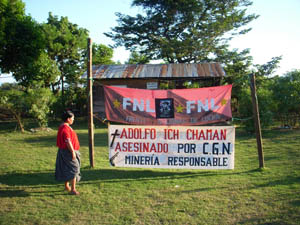For the first time a lawsuit against a Canadian mining company over alleged human rights abuses abroad will be heard in Canadian courts.
Lawyers for the alleged victims of rape and murder at a Guatemalan mine will be able to sue HudBay Minerals for the alleged gang-rapes of eleven women, the killing of its community leader Adolfo Ich, and the shooting, and resulting paralysis, of German Chub at HudBay’s former mining project in Guatemala.
In August 2011,
HudBay announced
it had sold the Fenix ferro-nickel mining project in Guatemala to the Solway Group, a private Russian company incorporated in Cyprus, but lawyers for the victims vowed to keep pushing for the lawsuits to be heard against the company in Canada.
A week ago, just before an Ontario court was set to determine the issue, HudBay abandoned its legal argument that the lawsuit should not be heard in Canada.
“HudBay fought this issue of whether the trial could be in Canada tooth and nail for over a year,” says Murray Klippenstein, lawyer for the Guatemalan Mayan plaintiffs. “Then they gave up at the eleventh hour, we think, based on the overwhelming collection of evidence. Certainly a major Canadian mining company represented by the preeminent Canadian mining law firm would not give up such a central point in such a key defence without careful consideration.”
HudBay is represented by Fasken Martineau DuMoulin LLP. The defence had filed extensive legal briefs arguing that the lawsuit should be heard in Guatemala, not Canada, despite evidence indicating that Guatemala’s justice system is dysfunctional, making it impossible for the victims to get justice there.
According to the United Nations, Guatemala is one of “the world’s most violent countries officially at peace.” Human Rights Watch says 99.75 per cent of violent crime in Guatemala goes unpunished due to corruption, and intimidation and attacks against judges and witnesses.
While the development effectively removes the legal argument that the case cannot be heard in Canada, Klippenstein says HudBay “continues to rely on antiquated corporate law concepts” to argue in that its corporate head-office in Canada is not legally responsible for the abuse committed by its wholly-owned and controlled overseas subsidiary corporation.
“While HudBay has dropped its forum non convenience defence it will still be relying on other corporate law concepts we think are not appropriate in this day and age,” he says.
Extensive cross-examinations of witnesses and experts took place in December via Skype from Guatemala as well as having some of the plaintiffs travel from the remote mountains of Guatemala to Toronto. There was also video and photographic evidence made available.
“This kind of cross-border overseas litigation is now entirely feasible. I think this is a sea change development because Canadian corporations have always been allowed to rely on a
forum non conveniens argument but this case shows that when a case is properly brought with all the evidence properly presented that defence no longer can be counted on,” says Klippenstein. “In this globalized world with video cameras everywhere and examinations by Skype, corporate boardrooms should realize this is now the state we’re in.”
The lawsuits continue in Ontario courts.
Update Feb. 28: Name of law firm representing HudBay corrected.

 it had sold the Fenix ferro-nickel mining project in Guatemala to the Solway Group, a private Russian company incorporated in Cyprus, but lawyers for the victims vowed to keep pushing for the lawsuits to be heard against the company in Canada.
it had sold the Fenix ferro-nickel mining project in Guatemala to the Solway Group, a private Russian company incorporated in Cyprus, but lawyers for the victims vowed to keep pushing for the lawsuits to be heard against the company in Canada.